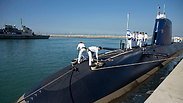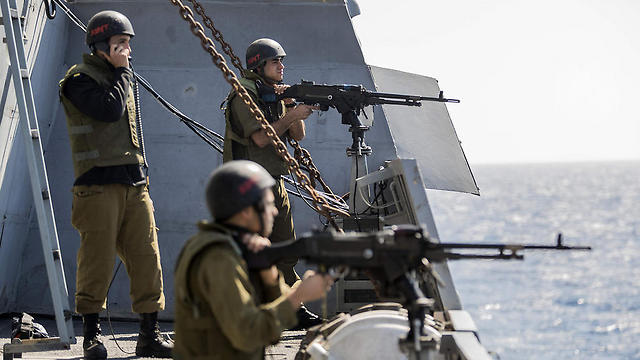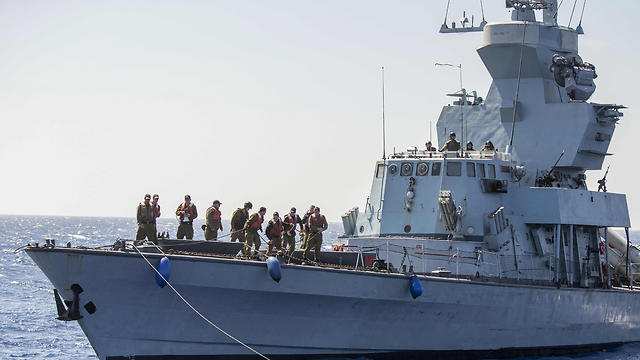
Illustration
צילום: AP
Now is the time for a grand maritime strategy
Op-ed: Israel needs an agency dedicated to the promotion of a grand maritime strategy that will enable it to reduce threats of choke holds to its sea access, promote its gas and energy interests and further other sea-linked goals.
In the pursuit of vital security and economic interests in the 21st century, Israel needs a grand maritime strategy. It requires a designated agency responsible for implementing it.
The sea is used for global commerce—millions of tons of goods are on the move right now over the waves—and for Israel, 95% of all trade is sea-based.
FROM THE STRAITS OF TIRAN TO BAB El-MANDEB
When Egypt shut the Straits of Tiran in 1967, Israel began feeling the choke hold of isolation. Today, strategic waterways like the Bab El-Mandeb Straits in Yemen, overlooking the Red Sea, are threatened by radical, Iranian-backed forces.
A grand maritime strategy will enable Israel to reduce the threat of future choke holds to its sea access. This will secure the country's access to international trade, which is vital to maintaining the daily fabric of life.
Such a strategy will also promote Israel's gas and energy interests, which exist in the form of offshore gas rigs in the Mediterranean Sea.
It is impossible to separate Jerusalem's economic and security interests. A grand maritime strategy can protect them both.
COHESION AND CLUSTERS ARE KEY
Currently, Israel’s maritime planning exists but is disjointed. One government ministry plans to create offshore islands for marinas, and a second ministry is considering an offshore airport. The Finance Ministry’s Planning Department is examining many of these issues, but there is still a lack of a centralized national maritime domain that can formulate goals and priorities.
The goal now should be to link up all sea-based planning, and appoint one party to be responsible for synchronizing the pursuit of Israel's various sea-linked interests.
The current set-up means that decision makers in one area do not take into account factors from another area that are important, and which should be influencing the national maritime policy.
Israel could draw lessons from the government of Portugal on this matter. When the Portuguese government took a decision to 'return to the sea,' it set up a Sea Ministry, whose job it is to take into account all of the national interests, and draw up policy accordingly.
Several other countries have something known as a maritime cluster, which is a concentration of all actors who are relevant to the sea sector. They sit under one roof, and each party presents its stance, interests, and recommendations. This generates significantly more knowledge and awareness at the political decision-making level.
Israel is highly advanced in the field of technological innovation, but paradoxically, in the maritime field, insufficient innovation is taking place. The time has come to change this. With the right government leadership and initiatives, we can enlarge the innovation map to encompass maritime technology. We ought to do so.
A GRAND STRATEGY BEGETS SECURITY
With a grand maritime strategy, a military naval strategy could flourish and evolve. Maritime security is a factor that influences all other national sea matters. The navy's job is to be the gatekeeper of the sea and to deliver information on threats in the surrounding environment, and here, job of Israel's navy would be vital. In this respect, Israel’s naval security needs are many and unique.
The Portuguese navy, for example, does not need to be concerned about mass disruption to the country's sea-based resources from terrorists and hostile, heavily-armed enemies. Israel does.
For a grand maritime strategy to succeed, the navy needs to prevent foes from infiltrating the area and threatening sea-based traffic and assets such as ports, energy sources, and other national infrastructure at sea.
A national maritime strategy could also include using the sea to forge better relations with neighboring states, and here too, the navy’s role would be central.
The navy is in a unique position to set up cooperation mechanisms with neighboring states against external threats, based on a common interest in maritime security and broad stability.
With the correct methodology, Israel can begin creating its own maritime cluster, one that will eventually be able to engage with the European Union's maritime cluster. A failure to do this might result in an Israeli inability to integrate itself into the international maritime arena.
Government ministries have already begun preparing projects and policies for the sea. All that is lacking now is a decision to synchronize all of their activities, for the good of Israel's economy and security.
LOOK TO THE SEA TO INCREASE INFRASTRUCTURE FOR THE POPULOUS
There are other important reasons to kick start a grand maritime policy process.
Israel requires a long-term plan to deal with the ever-growing crowded Israeli landmass, which is running out of building space for infrastructure sites.
In light of the urban sprawl spreading throughout Israel's population centers, there can be no land-based solution to the country's long term future infrastructure needs. Building a power plant on every available green hilltop is not the solution.
The next power station can be built on top of an artificial island, out at sea.
The sea can also play a vital role in addressing the growing need to find alternative sources of food supplies. With fish stocks eroding in the Mediterranean, one viable plan is to create sea farms in the depths of the Mediterranean, yielding both a sufficient supply for internal consumption, and exports as well.
These growing demands—civil, economic, and security—require a holistic strategy, and the time to begin formulating it is now.












